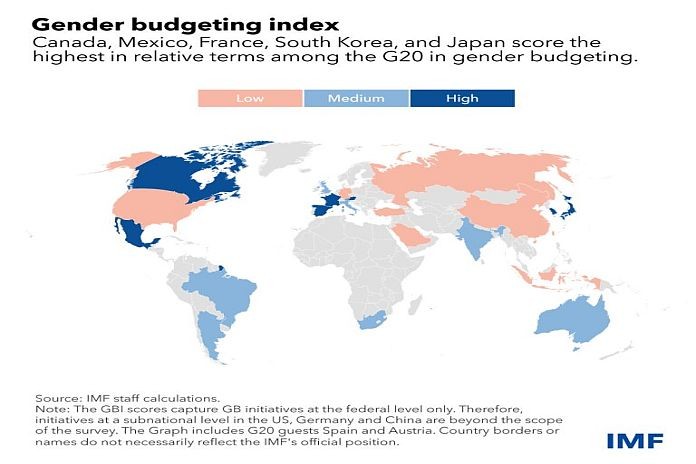By Teresa Curristine, Nino Tchelishvili and Sureni Weerathunga
The pandemic has deepened long-standing gender gaps, with women continuing to bear the burden of unpaid work. By structuring spending and taxation in ways that advance gender equality – a process called gender budgeting – governments can help close the gap.
In recognition of International Women’s Day on March 8, the Chart of the Week takes stock of gender budgeting practices in Group of Twenty countries using data from a recent IMF survey. The research shows that while all G20 countries have enacted gender-focused fiscal policies, the budgetary tools to operationalize, evaluate, monitor and audit these policies remain more limited. Too few countries assess the upfront impact of policies on gender or evaluate their effectiveness ex-post.
IMF staff assessed the relative performance of country practices, using a gender budgeting index (GBI) framed around the four pillars of the IMF’s gender budgeting framework. The index uses data collected from the IMF survey and ranks countries high, medium, or low, depending on how they score. As the Chart of the Week shows, relative to their G20 peers, Canada, Mexico , France, South Korea, and Japan score high on the GBI.
More than half of G20 countries have a legal framework in place requiring that gender goals and activities be incorporated in the budget, and almost all collect gender-disaggregated statistics to some degree. Countries also try to bring a gender perspective to the budget preparation process, by linking goals and performance indicators to gender, or by issuing budget circulars with a gender lens. However, just one third carry out up front gender assessments to understand the potential impact of new policies on gender equality.
G20 countries score relatively low in integrating a gender perspective into budget execution. Gender information is rarely included in government annual financial reports. Only seven countries do ex-post gender impact assessments and seldom use them to improve policy design. Few countries audit gender activities and programs, though there is some oversight by legislatures in about half of G20 countries.
Responses to the IMF survey highlight some of the challenges to effectively implementing gender budgeting, including a lack of guidance, coordination, and expertise in gender analysis and data. But the survey also reveals the keys to success: strong political backing, legislative requirements, and a ministry of finance that is firmly in the driver’s seat.
Making the impact of policies on equality more visible through better analysis and reporting can make a real difference in women’s lives.





